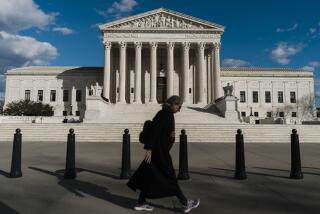AT&T; Case Weighs Secrecy
- Share via
SAN FRANCISCO — Even if telephone carriers are surrendering all the e-mail that travels on their networks to government investigators, customers have no right to sue -- regardless of whether the program is legal, federal lawyers told a judge Friday.
The Justice Department arguments came during the first court hearing over whether government demands for secrecy could scuttle a closely watched civil case against AT&T; Corp. for allegedly allowing the National Security Agency to monitor phone and data traffic.
Arguing to dismiss the case, Assistant Atty. Gen. Peter Keisler said a trial would divulge sensitive state secrets. And AT&T; lawyer Bradford Berenson said the company was immune from such lawsuits if it had high-level government approval for any cooperation it gave the NSA.
Citing national security, Berenson said AT&T; could not reveal whether it got that approval.
The arguments seemed to frustrate U.S. District Judge Vaughn Walker, who will rule later on whether to allow the case to proceed. The suit accuses the company of violating wiretapping and privacy laws by turning over calling records and the content of billions of e-mails.
“Congress has not given you a blanket, unlimited privilege,” Walker told Keisler.
Keisler said that even the acknowledgment or denial that AT&T; aided the intelligence agency could help unmask its sources and methods.
He said that was the sort of disclosure that led the U.S. Supreme Court to establish what is known as the state secrets privilege and direct judges to grant the executive branch “utmost deference” in deciding whether court proceedings risked harm to national security.
Walker, who has reviewed classified material submitted by the Bush administration, said that much of the alleged activity had already been disclosed by the media. He asked Keisler what more harm would be caused by mere confirmation.
Keisler said terrorists weighed the risks of being monitored with a given manner of communication against its usefulness. “By replacing this muddied picture,” he said, “you are enabling them to communicate more securely and efficiently.”
Walker continued to explore with lawyers from the Electronic Frontier Foundation, the civil liberties group that brought the case on behalf of AT&T; customers, how he could let the case continue. Among other things, he said he could appoint an expert to advise him on the significance of various secrets.
Although the secrets privilege usually carries the day, “some judges like Walker are straining at that, or want to find a way to do something other than dismiss just on the government’s say-so,” said University of Richmond law professor Carl Tobias, who has written on terrorism cases. “I think that’s right. If we can’t trust our judges to keep a secret, then what do we have?”
More to Read
Inside the business of entertainment
The Wide Shot brings you news, analysis and insights on everything from streaming wars to production — and what it all means for the future.
You may occasionally receive promotional content from the Los Angeles Times.









